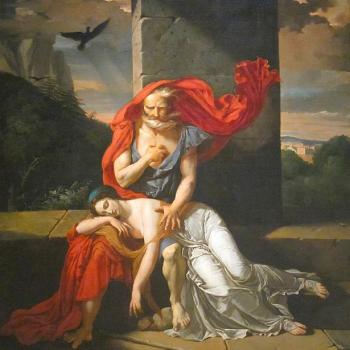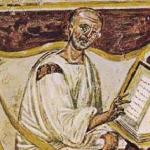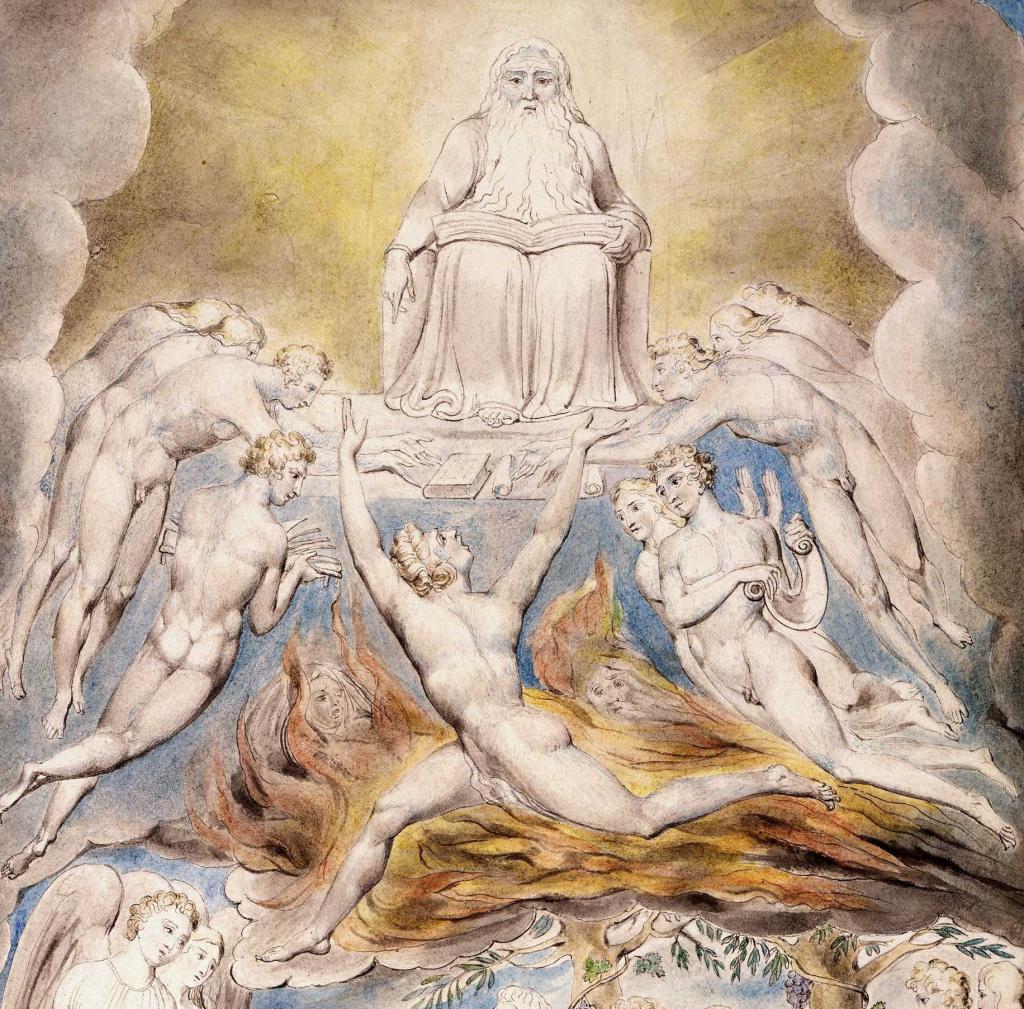[I do not normally give homilies nor post them as blogs, but seeing that I was asked to give the homily this Sunday (an All Saints’ Day service) at my church, I post it below. I hope it might provide some historical and theological food for thought. The title comes from a line of Dante’s]
Homily – All Saints’ Day – Cornerstone Anglican Church, Valparaiso, Indiana – 3 November 2019
“In His Will is Our Peace”
Who do you admire and why? And why does it matter whom we admire?
I want to try to address these questions with you today, and make some connections to this particular juncture in the church calendar, namely All Saints’ Day, and to our Scriptural readings.
For those of you not accustomed to recognizing All Saints Day, let me assure you that it can do no harm. In fact, it might do us all significant good. It makes us think about the past, about the faithful who have come before us and those faithful still living in our midst who might be a little ahead of us growing in the faith.
The earliest observance of the holiday was recorded in the early fourth century. But the day did not get fixed until the early seventh century under Pope Boniface IV, who consecrated Rome’s Pantheon to the Virgin Mary and all the Martyrs on May 13 in 609 AD. Pope Gregory III then made All Saints’ a holy day in the mid-eighth century and moved it to November 1. Today, Catholic and tradition-minded Christians tend to observe it. While Roman Catholics recognize the validity of all Christian baptisms and devoted lives, they reserve a special status for the truly noteworthy Christians who are formally recognized through two elaborate procedures known as beatification and canonization. Catholic churches can be named after saints—hence Saint Paul’s, Saint Peter’s, Saint Agnes’s.
In the course of more recent centuries and after the unpleasantness of intervening Christian divisions, many Protestant churches shied away from observing All Saints Days, reasoning that all Christians are saints and a select few should not be placed on a pedestal. There is significant New Testament sanction for such a view, not least the passage in I Peter 2:5 that speaks of the Priesthood of All Believers, that we are all, not an elite few, living stones making up together a spiritual house.
But even as I validate aspects of this line of reasoning, I still think that it is important that we, somehow, still manage to recognize extraordinary lives lived in service to God and to the Church. Who after all wants a world without heroes, without people we especially look up to and admire? What is more, those we admire are not restricted to the living. As Christians we believe in a teaching known as “the Communion of the Saints” (communio sanctorum), a phrase from our Creed that means that there is mysterious spiritual union among all members of the Church, living and dead; that we are all part of a single mystical body with Christ as the head, in which each member contributes to the good of all and shares in the welfare of all.
With this in mind, I want to mention to you two dead-but-I-believe-still-living saints whom I admire and who have been important for my own sense of vocation as a Christian teacher-scholar: One of these is Saint Augustine, a bishop from Africa who lived in the 300s and 400s, and the other is Saint Thomas Aquinas, a scholar who lived in Europe in the 1200s.
I am far from alone in admiring these two. In the grand sweep of Christian history, they have been widely admired and looked up to by many, especially perhaps but not only by those involved in education. In fact the great Italian poet Dante includes them both in the best part of his afterworld: in Paradise. In the Paradise or the Paradiso, the third book in his trilogy the Divine Comedy, Thomas Aquinas appears the realm of the Sun (the realm of those who are luminously wise), and Augustine makes a brief but important appearance near the end of the poem in the heavenly rose in the starry firmament. Both occupy choice positions in Dante’s scheme of things. As some of you no doubt know, this scheme is based on the old, pre-Copernican view of the Solar System that regarded the earth as the center of the cosmos. In Dante’s literary usage of this scheme in his Paradise, the more holy you are, the farther away you are from earth, beginning with the moon and going out to the last planet known at the time, Saturn, and eventually beyond that even to the stars and heavenly Empyrean. I mention this scheme of things here, because later I want to return to the lunar realm, the realm of the moon, the realm of those not-so-super-accomplished Christians—in a word, my realm!
So why do I admire these two saints. I admire Augustine for many reason, but I will mention three.
First, being an accomplished sinner, I resonate with how Augustine’s language really captures the inner conflict, the divided mind, that goes on in us when we have sinned by what we “have done, and by what we have left undone,” as our prayer of confession puts it. In his autobiography, simply called the Confessions, Augustine writes for instance, “My inner self was a house divided against itself.” At one point, he even as has the chutzpah to pray: “Lord, give me chastity, but not yet.”
Second, and perhaps more relevant to the vocation of an educator, Augustine’s life and work remind us that we should seek wisdom wherever we can find it and that all wisdom ultimately comes from God. Describing the impression that a book by the Roman orator Cicero made on him, Augustine writes: “My heart begin to beat with a bewildering passion for the wisdom of eternal truth. I being to climb out of the depths to which I had sunk in order to return to you [God]. . . . [The book taught me] to love wisdom itself, whatever it might be, and to search for it, pursue it, hold it, and embrace it. These were the words which excited me and set me burning with fire.” In reading these words, I often think that Augustine lived out what the Apostle Paul recommends in Philippians 4:8, when Paul writes: “Finally, brothers, whatever is true, whatever is noble, whatever is right, whatever is pure, whatever is lovely, whatever is admirable–if anything is excellent or praiseworthy–think about such things.” Augustine could have simplistically dismissed Cicero as a non-Christian Pagan, but he had a more discriminating attitude—one that I think that we ought to have when we encounter various non-Christian ideas and beliefs, recognizing at some level all people are created in the image of God and exhibit real, often fascinating, if sometimes lurking, elements of this aboriginal splendor.
Third, I admire Augustine because he calls our attention to the fact that all of our longings, our desires, our hopes, even if they are often warped and distorted, are ultimately signs that we seek the lasting peace and rest of our Lord. He famously begins his Confessions as follows:
“Can any praise be worthy of the Lord’s majesty? How magnificent his strength! How inscrutable his wisdom! Man is one of your creatures, Lord, and his instinct is to praise you. He bears about him the mark of death, the sign of his own sin, to remind him that you thwart the proud. But still, since he is a part of your creation, he wishes to praise you. The thought of you stirs him so deeply that he cannot be content unless he praises you, because you made us for yourself and our hearts find no peace until they rest in you.”
Let me now come to Thomas Aquinas. I like him not least because he reminds us that even the ponderous, the unattractive, and socially awkward have a place in the divine scheme of things. Google him. Thomas was a member of the Dominican order, whose motto is contemplata tradere, which might be translating “as passing down as tradition that which has been well thought.” For this reason, Aquinas is often recognized as a guiding star for colleges, universities, seminaries, and other educational institutions. Of course, much could be said about him, but let me simply read you one of his prayers, which in many ways sums up the general disposition of his mind and soul.
It is called “Before Study,” which he often prayed before his work and which I have often used with students and myself over the years:
“A Prayer Before Study” (Ante Studium)
Ineffable Creator,
Who, from the treasures of Your wisdom,
have established three hierarchies of angels,
have arrayed them in marvelous order
above the fiery heavens,
and have marshaled the regions
of the universe with such artful skill,
You are proclaimed
the true font of light and wisdom,
and the primal origin
raised high beyond all things.
Pour forth a ray of Your brightness
into the darkened places of my mind;
disperse from my soul
the twofold darkness
into which I was born:
sin and ignorance.
You make eloquent the tongues of infants.
refine my speech
and pour forth upon my lips
The goodness of Your blessing.
Grant to me
keenness of mind,
capacity to remember,
skill in learning,
subtlety to interpret,
and eloquence in speech.
May You
guide the beginning of my work,
direct its progress,
and bring it to completion.
You Who are true God and true Man,
who live and reign, world without end.
Amen.
Concluding Thoughts
Some of you might too might enjoy reading and learning more about Augustine and Aquinas. But for others they will not be your cup of tea. I mention them not necessarily to enjoin them in particular, though one could do worse, but rather to illustrate that our shared belief in “the communion of saints” is vast and deep, made up of the living and the dead, the mighty and the lowly, the learned and the unlearned. You might have other heroes, other saints that you admire. I imagine some in this room might admire Martin Luther or Martin Luther King, Dorothy Day or John Stott, or a former pastor, a camp counselor, a grandmother or a parent–or many, many others, drawn from different walks of life, the living and the dead.
But let me, finally, recognize a difficulty that comes with reading or thinking about great saints. Due to an invidious aspect of our nature, sometimes admiration can slip into envy or despair that we are simply mediocre, not that special, that we will never live up to the level of those whom we admire; and that we are, finally, humdrum, plain-vanilla, sub-standard, back-up, solidly B-team material.
With this thought in mind, let me return to Dante’s Paradise and the realm of the moon. There, Dante encounters a woman named Picarda, an obscure nun who had broken her vows but repented and wound up paradise. Being a mere mortal and not really understanding how things worked in the hereafter (at least as Dante the poet portrays it), Dante, a character in his own poem, asks Picarda if she is not jealous of those higher up in heaven and disappointed by her lowly, lunar state. In Dante’s own words:
But tell me [Picarda], do you, who are here content,
Desire to achieve a higher place, where you
Might see still more and make yourselves more dear[?]
With what I imagine is an amused, knowing look on her joyous face, Picarda replies to Dante’s untutored curiosity as follows:
“Brother, the power of love calms our will
So that we long for only what we have
And thirst for nothing else.
“If we desired to be more exalted
Our desires would be discordant
With His will, which assigns us to this place.
“That as you will see, would not befit these circles
If to be ruled love is here required
And if you consider well the nature of this love.
“no, it is the very essence of this blessed state
That we remain within the will of God,
So that all our wills combine in unity.”
And then Picarda—the obscure, wayward, repentant, blessed nun—looks at Dante and utters one of the best lines in the whole poem:
“In his Will is our peace
It is toward this sea that all things move.”
In sum, All Saints’ Day rightly focuses our attention on those, living and dead, who have gone before us and set a good example. We should even be on the lookout for the exemplary poor in spirit, the exemplary meek, those who really do hunger and thirst for righteousness, the merciful, the pure in hear, the peacemakers, and, not least, those persecuted for righteousness sake” It is right and proper that they inspire us, that they help us elevate our own game.
But we should neither envy them nor despair that we will never match up. So even as we press on, let us recognize with Picarda that whoever we are, wherever we are, with whatever baggage we bring to the table, and with whatever skills, gifts, and competencies we have, God too has given us important work for us to do, beginning here today, now.
But I will let Picarda have the last words:
“In His Will is our Peace
In His will is our Peace
In His Will is our Peace.
It is toward this sea that all things move.”
In the name of the Father, and the Son, and the Holy Spirit. Amen.















